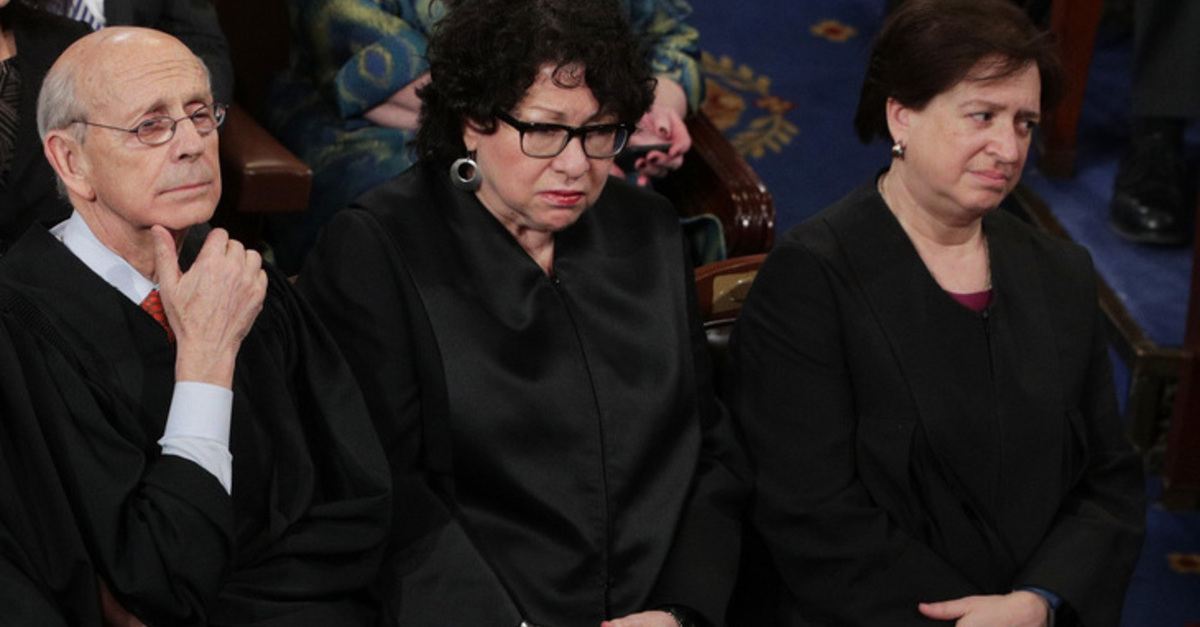
The Supreme Court of the United States heard oral arguments Tuesday in the consolidated cases Brnovich v. Democratic National Committee and Arizona Republican Party v. Democratic National Committee. Tensions were high as attorneys and justices jousted over the impact Arizona voting regulations have on racial minorities.
The Democratic National Committee (DNC) challenged two Arizona voting policies on grounds that they violated federal anti-discrimination law. One policy is Arizona’s requirement that any ballot be thrown out if it was cast at the wrong precinct — an error that affects thousands of voters in every election. The other is a law criminalizing what has been called “vote harvesting” — the collection and delivery of a completed ballot by a third-party other than family members, caregivers, or mail carriers authorized by statute.
The DNC has argued—and the Ninth Circuit agreed—that these practices violate the Voting Rights Act, because they result in the disproportionate disenfranchising of racial minorities. Republicans argue that the Ninth Circuit applied the wrong legal standard to the wrong statistics, and that the practices are legal because only a tiny fraction of all voters were affected at all.
The Court’s liberal wing was noticeably inflamed during arguments by the Arizona Republican Party and Arizona’s Attorney General.
Michael A. Carvin advanced the Republican argument that the law only requires that voters be given equal opportunity to vote—not that they actually use that opportunity in a manner proportional to whites. Justice Sonia Sotomayor wasn’t having it—neither accepting Carvin’s take on the law nor on the facts.
As Carvin argued that minority voters had not really been “denied” their right to vote, Justice Sotomayor schooled him on her interpretation of the concept of “denial.”
“Excuse me,” the justice interrupted. “If you can’t vote because you’re a Native American or Hispanic in areas where car ownership rates are very small, where you don’t have mail pickup or delivery, where your post office is at the edge of town, so that you require either a relative to pick up your vote or you happen to vote in the wrong precinct, because your particular area has a confusion of precinct assignments — if you just can’t vote for those reasons and your vote is not being counted, you’ve been denied the right to vote, haven’t you?”
The progressive justice interrupted Carvin multiple times on the facts as well.
“The district court found no meaningful threat that ballot collection leads to fraud,” she reminded Carvin. “It found no meaningful threat whatsoever.”
Sotomayor similarly skewered Arizona Attorney General Mark Brnovich (R) on his argument. The justice pressed Brnovich as to why Arizona could not meet the burden of simply justifying the need for its regulations. Brnovich answered that the law did not ask for that justification.
“By your own admission the test is a totality of circumstances test,” Sotomayor railed against Brnovich.
She interrupted, “Counsel. The test requires an examination of the totality of the circumstances. Can you seriously argue that the reason for why you did something isn’t part of that test?”
When Brnovich would not agree, Sotomayor would not let the point go.
“I’m asking you a simple question: are you arguing that the reason why you did something is not part of the totality of the circumstances.”
Brnovich dodged again.
“Counsel, why is that question so hard to answer? Yes or no?” snapped an obviously annoyed Sotomayor.
Justice Elena Kagan followed up with exasperation all her own. Kagan sparred with Brnovich over what kind elections practices might disadvantage racial minorities. After multiple exchanges of hypotheticals, Brnovich would only concede, “it depends on the circumstances and does that have a substantial impact on minorities.”
“Yes it does,” Kagan shot back.
“If [the polls are only open] 10-2 then people who work and don’t have cars, then the impact has been shown to be that Black voters will be very disproportionately impacted,” she added.
Justice Stephen Breyer was noticeably less persnickety than some of his colleagues, but still hammered both lawyers defending Arizona’s practices with the same inquiry. Breyer explained that courts have often applied the same legal test to a number of non-voting anti-discrimination laws. Courts require a plaintiff show “significant disparity” and “but-for causation,” and then allow a defendant to show some non-race-related reason for the regulation that could not be accomplished in a different manner.
Breyer asked why the same standard wouldn’t be the correct one to apply in the context of voting discrimination. Carvin called the framework Breyer described “an interesting test,” but said it just wasn’t what Congress intended in the Voting Rights Act. Breyer did not appear particularly satisfied.
Although the liberal trio was united it its overt skepticism toward the Arizona regulations, the conservatives had moments of frustration of their own.
Chief Justice John Roberts at one point told Jessica R. Amunson, who was arguing against the regulations, “those are a lot of words. I really don’t understand what they mean, but my time is up.”
Justice Samuel Alito repeatedly expressed concern that a ruling against Arizona’s voting practices would expose the judiciary to an onslaught of cases challenging every possible election practice.
Although the voting practices at issue in the litigation parallel much of what was disputed during the 2020 presidential election, the cases originated from the 2016 election. Still, the Court’s decision could impact not only voting practices in Arizona, but across the nation—and for every election to come.
As the Brennan Center pointed out, the Court has an opportunity to impact the future of democracy.
[image via Alex Wong/Getty Images]